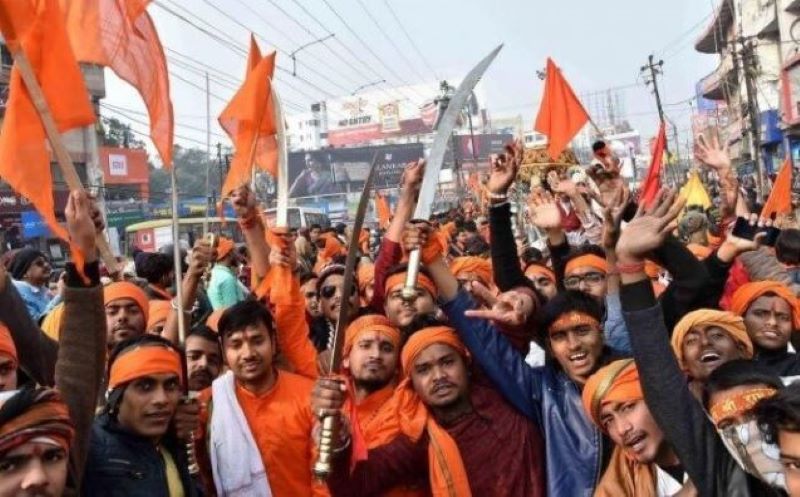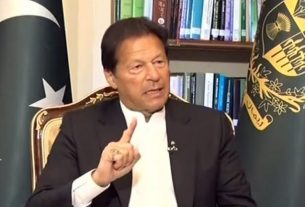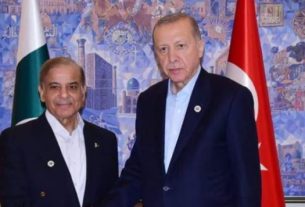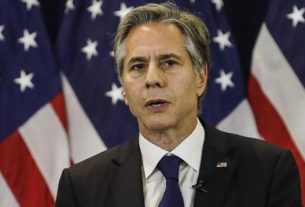The northeastern state of Tripura does not have a history of inter-religious clashes. Now, with PM Modi’s BJP in power, that’s changing.
Kadamtala (Tripura), India – The last thing that Shahin Ahmed, 38, remembers of his brother, Alfeshani Ahmed, was a frantic call with him amid gunshots and screams.
At about 9pm on October 6, Alfeshani, a 36-year-old owner of a smartphone and electronic accessories shop, had just hastily shut his shop in the Kadamtala market to rush back home to Jher Jheri, a Muslim-majority village over three kilometres (about 2 miles) away in North Tripura, a district in northeast India.
A mob was running riot in the market, and Ahmed knew his shop wouldn’t be spared. “So, he left the shop, taking only the account ledger of his shop containing all his financial transactions and records,” Ahmed said.
Tension had previously flared in the early hours of the day between the local Hindus and Muslims in the area after a Muslim driver of a car refused to pay a subscription to a local Hindu club for Durga Puja, a major Hindu festival. The driver and a passenger, both Muslims, were also allegedly assaulted by the members of the club.
The Kadamtala subdivision, which includes the market as well, has a mixed population of Hindus and Muslims, with Hindus forming more than 64 percent of the population and Muslims accounting for nearly 35 perent. Muslims, the state’s largest minority group, also make up about 9 percent of Tripura’s population of 3.6 million.
Muslims in Kadamtala and the adjoining areas in the Hindu-majority North Tripura have traditionally paid subscriptions to Durga Puja celebrations as a sign of harmony between Hindus and Muslims. Manik Saha, the state’s chief minister, had previously warned groups against forcefully seeking the payment of subscriptions for Durga Puja.
The situation, on October 6, however, snowballed by the evening, as Hindu and Muslim groups clashed, leading to the heavy deployment of security personnel. The police baton-charged the mobs and opened fire, according to reports.
Seventeen people, mostly police personnel, were injured in the communal clashes and one person died.
It was Alfeshani. “He was on the phone with me when a bullet hit him on the head,” Shahin Ahmed, Alfeshani’s brother, told Al Jazeera.
Bhanupada Chakraborty, who was North Tripura district’s superintendent of police at that time, however, said that police did not target anyone specifically, and Alfeshani’s cause of death is “under investigation”.
His family, however, dispute the police’s version. “He was shot in the head by the police,” Alifjaan Begum, Alfeshani’s mother, said, welling up. “The fire in my heart will never be doused. It was a murder.”
The trigger
Earlier in the day, a delegation of Muslims asked the local police to arrest those who were responsible for the alleged assault on the Muslim driver and passenger. The Kadamtala police, in response, had also detained two people in connection with the alleged assault on the Muslim driver and the female passenger. Their detention came after a protest by the local Muslims.
But tensions spiralled further after another member of the Durga Puja organising club made an “inflammatory comment” about Prophet Muhammad on Facebook, said a person who was part of the Muslim delegation, requesting anonymity. Al Jazeera can independently verify the comment.
An irate Muslim group went looking for the young man in a Hindu-dominated neighbourhood. “They pelted stones and broke down doors and windows, creating a scene of panic among the Hindus, and asked them to hand over the Hindu boy to them,” Bibhu Debnath, secretary of the Kadamtala Market Association, told Al Jazeera.
That in turn enraged Hindus. Groups affiliated with the Hindu majoritarian Rashtriya Swayamsevak Sangh (RSS) – the ideological fountainhead of Prime Minister Narendra Modi’s Bharatiya Janata Party (BJP), which also rules in Tripura – vandalised a few Muslim shops in the Kadamtala market.
As the back-and-forth rioting by the two groups intensified, Alfeshani tried to escape.
He couldn’t.
‘Selectively burned’
On the morning of October 8, Suhail Ahmed Khan, 40, finally made it to his shop in the Kadamtala market. It was a five-minute ride from home, but it took two days before it was safe for him to go there, because of the violence.
A day earlier on October 7, local Hindus and a mob from outside of Kadamtala allegedly belonging to the Vishwa Hindu Parishad and Bajrang Dal – groups affiliated with the RSS – had gathered on the market’s outskirts. Then they made their way to the market, “burning and looting houses”, said a local political leader, Heera Lal Nath from the opposition Congress party. Tapas Roy, RSS’s publicity-in-charge in Tripura denied these allegations.
Khan’s shop was burned to a cinder. The shop, which stocked smartphones and other electronic gadgets in the Kadamtala market, had also been looted.
This was a shop that Khan had invested his life’s savings in. “Over 57 lakh rupees [$67,550] had gone in flames,” Khan said, struggling to talk. “With such loss, my life became death.”
“It was collective punishment,” Khan said, struggling to talk. “They have ruined us both mentally and economically.”
Right at the centre of the Kadamtala market, the Kadamtala Jama mosque was also set ablaze by a mob the same day on October 7. “They burned all the religious books,” Abdul Motin, adviser to the Kadamtala Jama mosque committee, told Al Jazeera.
On the market’s outskirts in the Saraspur neighbourhood, Islam Uddin, who is 40, is rebuilding his charred home. His house was among the 10 Muslim-owned dwellings, located in a neighbourhood with a sizeable Hindu population, which were torched by a mob on the same day on October 7.
“My family and I had to flee for our lives,” he said.
His neighbour, Atarun Nessa, whose home was burned, is now surviving on charity from local NGOs. Her family’s only source of income – an e-rickshaw that her husband, Siraj Uddin, would ply – was charred by the Hindu mob.
“It was the only way for us to manage a morsel,” 47-year-old Nessa told Al Jazeera, breaking down. “What life are we living now?”
Several witnesses, requesting anonymity, claimed that the police stood by as “spectators” when the irate Hindu mob was carrying out the rampage on October 7.
Local legislator Islam Uddin, from the Communist Party of India (Marxist), claimed the police allowed the arson. “If [police] wanted, they could have stopped the Hindu mob,” he said, and added that “it all felt like they were picking a side”.
Sudip Roy Barman, a legislator from the opposition Congress party, said that violence in Kadamtala was “state-sponsored” by the BJP. “The BJP wanted to instigate the Muslims.”
When reached for comment, Chakraborty, the then-superintendent of North Tripura’s police, told Al Jazeera: “I am not the right person to speak with the press.”
Al Jazeera’s calls to the Tripura police chief, Amitabh Ranjan, were not answered. Al Jazeera has also sent his office a detailed questionnaire but has not yet received a response. He, however, has previously rebuffed allegations of police inaction during the violence.
‘Muslims live in fear’
The clashes in Kadamtala are only the latest instances of inter-religious violence in Tripura in recent months, after tensions erupted repeatedly in August and October, over allegations that Muslims had defaced Hindu deities. In retaliation, mosques were attacked, and in some cases, Muslim homes were burned.
For Sultan Ahmed, a Tripura-based activist and national secretary of the Students Islamic Organisation of India, a Muslim student body, these latest attacks bring back memories of devastating riots that singed large parts of the state in 2021.
“Muslims in Tripura still live in fear of what happened then,” Ahmed said.
Large Hindu mobs, affiliated with far-right groups, attacked Muslim homes and mosques across many districts in the state, especially in North Tripura, which shares a 96km-long (60-mile) border with Bangladesh.
The attacks were in response to Muslim mobs in Bangladesh that had attacked the Hindu minority there after a Quran was discovered on the knee of a Hindu deity during Durga Puja celebrations.
“Since then, any attacks on Hindus in Bangladesh puts Muslims living in North Tripura on edge,” Ahmed added.
‘Hindus have changed’
Tripura has long witnessed ethnic violence between the state’s tribal communities and Bengalis. The sleepy hill state, however, did not have a history of clashes on religious lines between Hindus and Muslims.
Until Modi’s BJP came to power in 2018.
While India’s Ministry of Home Affairs has stopped publishing statistics on inter-religious violence, data available from the National Crime Record Bureau on statewide riots from 2016 to 2020 shows that Tripura reported only two cases of communal violence, and those too were in 2019.
However, that number has risen sharply since, with Hindu groups trying to “foment communal sentiments” in about a dozen instances since 2018, Uddin, the lawmaker from the Communist Party of India (Marxist), said.
These incidents include right-wing outfits attacking rubber plantations owned by Muslims in the state and claiming that an ancient mosque is a temple.
Instances of mob lynchings of Muslim men by Hindu mobs have also grown.
BJP’s spokesperson in Tripura, Subrata Chakraborty, told Al Jazeera that “no such [group] gets privilege under the current government”.
“This government is pro-active government and pro-development government,” Chakraborty said.
Meanwhile, Kadamtala remains tense. “Muslims who account for 70 percent of customers in the market now do not want to buy anything from a Hindu shop,” Khan, whose shop was set ablaze by a Hindu mob, said. “The harmony that there was will take years to come back, or maybe never.”
For Abdul Haque, a former member of the BJP’s minority wing in Kadamtala, the recent violence was emblematic of a broader shift.
“Earlier, during Hindu festivals, they would fix the loudspeaker in a way that it does not disturb the Muslims, but now, they crank up the loudspeakers and play provocative songs,” he said.
“Hindus have changed here.”__Al Jazeera





